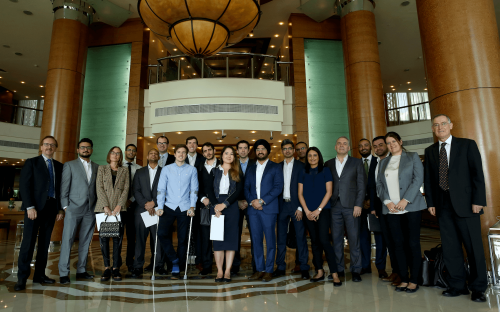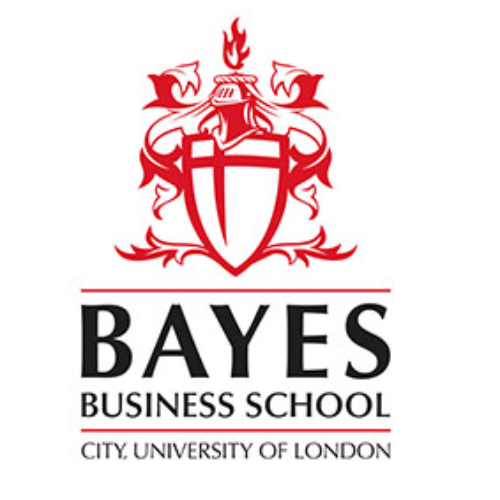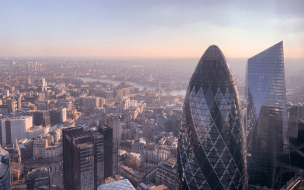The Dubai Symposium is an opportunity for MBA and Executive MBA students at London’s Cass Business School to explore new careers in the Middle East
An MBA lacking first-hand knowledge of international markets is like a kite on a windless summer afternoon; both will struggle to get off the ground.To quell this, ’s Dubai Centre runs the Dubai Symposium, a module giving students from across the school’s MBA spectrum —Full-Time MBA, Modular Executive MBA, and Executive MBA (EMBA)—the chance to dive into the business culture of the Middle East.
On the module, students attend company visits and embark on cultural encounters that help them understand modern Arab society, key business sectors such as trade and transportation, hospitality, oil and gas, and the potential for renewable energy in the region.
“I hadn’t been to Dubai before, but since the symposium I have been every month,” says Will Cleverly, an EMBA graduate from Cass who attended the symposium last year.
He is a director of Offshore Wind Consultants Limited, a consulting firm advising developers on how best to roll out offshore wind projects around the globe—the firm won a contract for a piece of work in Dubai around the time Will was attending the symposium, giving him the chance to move into a more global role.
“The pace and ambition of Dubai sparked an interest in me,” he says. “It was clear renewable energy was an industry the Emirate was beginning to lead in, and that was exciting.”
Jumping at the chance to work more in the region, the Dubai Symposium gave William first-hand experience of the Middle Eastern market. The diverse schedule—visiting multiple companies in various sectors—gives students the chance to engage the employees who work there on how to meander the differences in business style between regions.
“An MBA is supposed to equip you with the skills to run a global company, so having been out to these countries and seeing how business works there is definitely valuable,” adds Will. “I don’t think I’d have gone out there so soon without the MBA, so it certainly opened opportunities for me.”
Positioning itself, not just a module for the students to develop their understanding of the Middle East, but as a program designed to cultivate economic development in the region, the aims of the Dubai Symposium run parallel to the Cass Executive MBA in Dubai—a specific program that has been targeting executives in the Middle East for the past decade.
“Dubai acts as a hub for a very large region beyond MENA, into Africa, into central Asia, South East Asia, and beyond,” says Roy Batchelor, professor of banking and finance at Cass Business School, who was also the program director for the Cass EMBA in Dubai between 2009-2016. “Listening to the stories of business leaders there, you get to see the world from a very different view point.”
Roy—who is due to attend an information session in Dubai for the Cass Dubai EMBA, on the 8th March—adds that by immersing yourself in the region you begin to learn that success has come from a culture of “strong leadership, and a shared vision [of the future], an embrace of technology and globalization, and an understanding that society and the education system has to change to meet these challenges.”
That outward looking attitude has been promoted by the fact that 80% of the workforce in Dubai are not nationals. Roy cites the recent visit of Indian prime minister Narendra Modi to the UAE, and the plans to construct a Hindu temple in Abu Dhabi after his trip. “It tells you how much tolerance there is of diversity in what outsiders might think of as a buttoned-up society,” he continues.
The MBA—a beacon of diversity itself—is viewed very positively in the region, as the young population in the Middle East is under pressure to professionalize and compete in a very open and internationally competitive labor market. “They understand in a lot of organizations that to progress through certain roles an MBA is almost essential,” confirms Roy.
“That’s really the basis for why went to Dubai in the first place,” he concludes, “we recognized this as a global city, with a large professional class emerging who were hungry for the kind of expertise and understanding that a highly ranked business school could bring them.”
Student Reviews
Best Journalism school in Europe
When I first stepped onto the campus of City, University of London, I knew I was in for a ride - and not just on the Tube! With its vibrant energy and an impressive repertoire of programs, City U became my home away from home.
The Journalism program was kind of a big deal. Rumour was that we were the best in Europe!
The lecturers were not just experts in their field; they’re practically journalistic royalty. They were invested, passionate, and had a knack for turning the most flat press release into a riveting news story. With their guidance, I’ve learned to navigate the chaotic world of media like a pro.
The campus was a melting pot of every culture, being that we had such a diverse international crowd.
Being in the heart of London, I had the world at my fingertips - there was always a new corner to explore, a hidden gem of a cafe to discover, or a street performer!
City, University of London wasn't just a university; it was a chapter in my life story that I’ll never forget.
Learning environment
The teacher-learner ration is manageable, giving each learner a chance to gain personal attention. It is also easier following up on the progress of a student, as the numbers per class is not large. the conducive environment for learning includes clean classes, standard desks, world class instructional facilities and the opportunity to engage lecturers even after their sessions. The team spirit at City is above board, with learners getting chance to learn both from instructors and colleagues. This is the university of choice; the place to be.
Classes
I liked that each class had a manageable number of learners, making the professor-learner ratio favor knowledge acquisition. I also liked that study schedules were manageable, and not overwhelming. The focus on talents and gifts even within the learning environment makes it possible for learners to achieve the best of their potential, and this has worked to the advantage of those that have schooled at City, University of London
Classes
The diversity at City University facilitates interactions and is a direction toward the unity of the world. The classes are well built to match the number and needs of all students regardless of the elements of diversity that set people apart. The use of technology in delivery makes learning even more interesting and achievable. At City University there is no distinction pegged on the issues that make people unique.
professors
The team of lecturers at the Uiversity are well experienced. Their level of insight and the methodologies of delivery works for the interes of the leaeners. My learning experience was largely boosted by the level of knowledge of the professors at the institution, and their passion to transfer the same to learners. I appreciate every class I attended because of the level of insight I was able to gather
The best university I’ve been to
The campus and the people I've met have made it a wonderful experience. I was reared in a small town with a graduating class of only 88 individuals, so moving to City University was a huge adjustment for me. My dorm has more residents than my whole high school combined! I enjoy the atmosphere here, and everyone is so friendly. Outstanding academic options and a stunning campus. Really great from beginning to end. The educators genuinely love what they do, and the students are ready to learn. On or around college, there is always something to do with friends, and the social scene is particularly warm.
Bayes Business School
As a student at City university attending Bayes Business School I would totally recommend choosing this university as the experience is exceptional with great social networking opportunities . Professors are significantly helpful, delivering with excellence and professionalism. Everyone is happy to help and make you feel welcomed in such an esteem university as City, offering exceptional development and guidance through out the course.
Economics and Politics
Incredibly amazing university, the way they polish students and help them boost their morale and think intellectually is worthwhile. Many universities have international partnerships to allow exchanges between their students. The most obvious subjects for these opportunities would be those that involve languages, and the study of people and places.
Clinical biology
I really like it it’s perfect for me with not too many people and not too few either. All the modules are amazing. I love the toy bar. I love all the societies that I’ma part of. Especially the colour Bollywood society
Unlocking My Potential at City University London
My time at City University London was truly transformative. The university's vibrant community and diverse extracurricular activities allowed me to forge lifelong friendships and professional connections that extend beyond the classroom. I was impressed by the university's commitment to academic rigor, character development, and personal growth, which created an ideal environment for me to reach my full potential. The research-driven and industry-relevant curriculum provided me with a solid foundation in international business, while the dedicated faculty and staff offered invaluable guidance and support. I feel grateful for the well-rounded education and holistic experience that City University London offered, preparing me for success in my career and beyond.
Rather interesting
The academics are tough, but in a good way. The professors are experts in their fields, so you know you’re learning from the best. They push you to think for yourself and really dive deep into the subjects. But it’s not all about hitting the books; London itself is like an extension of the campus. You’ve got museums, galleries, and just the general buzz of the city to keep you inspired.
Urban campus life
At the University of London, I have experienced dynamic and diverse academic environment where I was challenged by rigorous coursework. You will have the flexibility to choose from the wide range of courses, participate in numerous extra-curricular activities and take advantage of the many opportunities
Studying at a top level
At City, University of London, academics are known for their dedication to student success. They employ interactive teaching methods, generally in small class sizes, and prioritize personalized learning above traditional lectures. Group projects, debates, and hands-on activities help students stay involved and retain knowledge. What stands out is the instructors' frequent check-ins with students, whether through additional study sessions, comprehensive feedback, or simply being available to answer queries. They demonstrate a genuine interest in students' personal and academic development, making their assistance absolutely outstanding.
This place is amazing
My experience at City, University of London, has been great. The lectures are where it's at; our presenters are industry specialists who transform complex subjects into captivating narratives that leave you wanting more. They are enthusiastic about teaching and employ novel approaches to bring their subjects to life. I've witnessed firsthand their desire to go above and beyond, whether by staying late after class or sharing additional materials. They are committed to ensuring every student's success, and it is evident that they are invested in our educational path.
Genuinely assistance and care
City, University of London, has been a fantastic experience for me. The instructors are specialists in their subjects, and their passion and participation in teaching is encouraging. They are constantly accessible to answer questions and offer assistance, making the learning experience genuinely exceptional. The school and surrounding region are great, with a lot to do and see. I've enjoyed my time here and value the high-quality education I've gotten. The university's commitment to providing entertaining and helpful lectures has made a significant difference in my academic career.
The value of good education
My experience at City University, London, has been extraordinarily beneficial. The lecturers are kind and actually care about their students' success, going above and beyond to ensure we understand the content. The academic environment is excellent, and the university fosters a strong sense of community. The professors genuinely care about their students, and there are numerous tools accessible to help us throughout our studies and beyond. I am glad for the opportunity to study here, and I value the university's commitment to student success.








